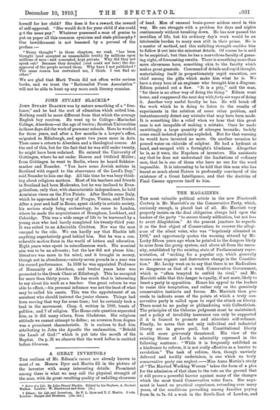JOHN STUART BLACKIE.*
JOHN STUART BLAMED& was by nature something of a "free- lance," and he had the sort of education which suited him. Nothing could be more different from that which the average English boy receives. He went up to College—Marischal College, Aberdeen—at the age of twelve ; Scottish Universities in those days did the work of grammar schools. Here he worked for three years, and after a few months in a lawyer's office, migrated to Edinburgh, and spent two years more in Arts. Then came a return to Aberdeen and a theological course. At the end of this, but for the fact that he was still under twenty, he might have been ordained. He entered the University of Gottingen, where he sat under Heeren and Ottfried Muller; from Gottingen he went to Berlin, where he heard Schleier- macher and Neander. "You have some Jewish notions in Scotland with regard to the observance of the Lord's Day," said Neander to him one day. All this time he was busy think- ing about religious matters. Most of his teachers and friends in Scotland had been Moderates, but he was inclined to Evan- gelicalism, only that, with characteristic independence, he held Arminian views on the Five Points. After Berlin came Italy, which he approached by way of Prague, Vienna, and Trieste. After a year and half in Rome, spent chiefly in artistic society, his serious study being archaeology, he came to London, where he made the acquaintance of Brougham, Lockhart, and Coleridge. This was a wide range of life to be traversed by a young man who had barely completed his twenty-third year. It was suited to an Admirable Crichton. Nor was the man unequal to the role. We can hardly say that Blackie left anything superlatively good behind him. But he was a con- siderable motive force in the world of letters and education. Eight years were spent in miscellaneous work. His nominal aim was to be an advocate; bat the law did not please him; literature was more to his mind, and it brought in money, though not in abundance,—ninety-seven pounds in a year was his record performance. In 1839 he was appointed Professor of Humanity at Aberdeen, and twelve years later was promoted to the Greek Chair at Edinburgh. This he occupied for more than thirty years. He has much that is interesting to say about his work as a teacher. One great reform he was able to effect,—his personal influence was not the least of what may be called his assets. This was the appointment of an assistant who should instruct the junior classes. Things had been moving that way for some time ; but he certainly took a lead in the movement. Chap. 6, written in 1889, treats of politics ; and 7 of religion. The Home-rule question separated him, as it did many others, from Gladstone. His religious attitude we cannot attempt to define ; an aversion from dogma was a prominent characteristic. It is curious to find him attributing to John the Apostle the exclamation, " Behold the Lamb of God!" which is put into the month of the Baptist. On p. 31 we observe that the word helluo is omitted before librorum.


























































 Previous page
Previous page